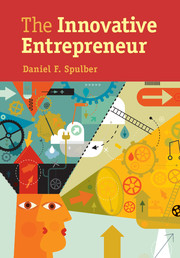Book contents
- Frontmatter
- Contents
- Preface
- Acknowledgments
- 1 Introduction
- 2 Entrepreneurial Motivation
- 3 Innovative Advantage
- 4 Competitive Pressures and Entrepreneurial Incentives to Innovate
- 5 Creative Destruction
- 6 Creative Destruction
- 7 Creative Destruction
- 8 Creative Destruction
- 9 The Wealth of Nations
- 10 Conclusion
- Bibliography
- Index
- References
3 - Innovative Advantage
Entrepreneurial Initiative and Incumbent Inertia
Published online by Cambridge University Press: 05 July 2014
- Frontmatter
- Contents
- Preface
- Acknowledgments
- 1 Introduction
- 2 Entrepreneurial Motivation
- 3 Innovative Advantage
- 4 Competitive Pressures and Entrepreneurial Incentives to Innovate
- 5 Creative Destruction
- 6 Creative Destruction
- 7 Creative Destruction
- 8 Creative Destruction
- 9 The Wealth of Nations
- 10 Conclusion
- Bibliography
- Index
- References
Summary
When do entrepreneurs innovate more efficiently than do incumbent firms? Entrepreneurs encounter entrepreneurial inertia as a result of the costs of establishing new firms, the costs of obtaining complementary assets, and the opportunity costs of innovation. Entrepreneurs, however, can benefit from individual initiative and creativity that may not be feasible for managers of established organizations. Existing firms suffer from incumbent inertia as a result of adjustment costs, diversification costs, the replacement effect, and imperfect adjustment of expectations. This chapter examines the innovative advantage of entrepreneurs in comparison to existing firms.
Incumbents often appear to have insurmountable advantages over entrepreneurial entrants. Most significantly, existing firms have complementary assets that enhance the returns to new technologies, including human capital, business reputations, market knowledge, customer and supplier relationships, and sources of finance. Existing firms have the necessary expertise to develop new technologies when they already engage in extensive internal R&D and participate in R&D joint ventures and consortia. Existing firms have the ability to obtain new technologies because of their experience in licensing and purchasing inventions, commissioning research by specialized contractors, and working with technical consultants and university researchers. Additionally, existing firms have trained scientific and technical personnel with experience in applying existing technologies that can be used to obtain, develop, and apply new technologies. Entrepreneurial entrants in contrast face various barriers to innovation including the transaction costs of obtaining assets that are complementary to innovation.
- Type
- Chapter
- Information
- The Innovative Entrepreneur , pp. 78 - 122Publisher: Cambridge University PressPrint publication year: 2014



